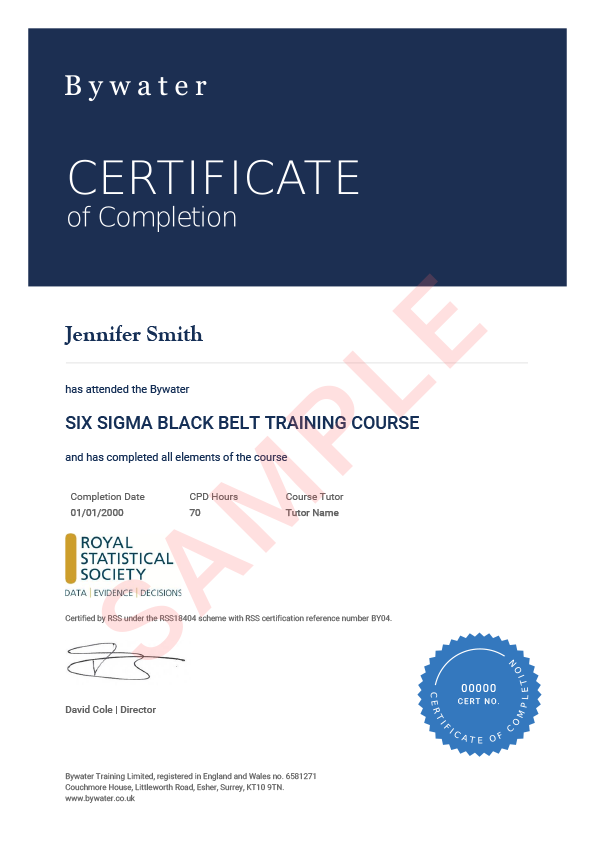Six Sigma Black Belt Training Course
DURATION
10 daysCPD
Equivalent to 70 hoursCERTIFICATES
All delegates will receive a certificate on completion.DELIVERY OPTIONS
Course Approval

Attending this Royal Statistical Society certified Six Sigma Black Belt course equips delegates with Six Sigma skills at an expert level.
The 10-day course combines our Lean Six Sigma Green Belt training course with further advanced training to give delegates a complete education in Six Sigma tools and techniques, from introduction through statistical analysis to leadership skills.
Students can practice their learning during the course through case studies and exercises.
At the end of the course students will receive a recognised Six Sigma Black Belt training certificate.
Click to read the Six Sigma Black Belt course flyer.
- want an expert level understanding of Six Sigma and a recognised Six Sigma Black Belt certificate
- will be responsible for training and coaching others on the use of process improvement techniques
- will lead/manage improvement projects using the define, measure, analyse, improve, control (DMAIC) methodology
- need to deliver agreed benefits of a Six Sigma project within an organisation
- are taking a leadership role with responsibility for stakeholder needs during Six Sigma implementation projects
- will be required to identify gaps in competencies within the team or organisation
We offer alternative paths to Black Belt qualifications to suit different needs. Delegates who have previously completed our Lean Six Sigma Green Belt training course or similar will benefit most from attending our Six Sigma Green Belt to Black Belt upgrade course.
Anyone seeking to apply for Six Sigma certification against ISO 18404 through the RSS 18404 Sector Scheme may like to look at our 13-day RSS 18404 Six Signa Black Belt Development Programme.
As the course incorporates our Six Sigma Green Belt training, students do not need prior knowledge to attend.
Students can attend the 10-day course in full over two consecutive weeks, or book two 5-day courses separately.
Please note this course incorporates advanced mathematical and statistical elements. Delegates are required to use Excel, or equivalent, during the course.
- overview of ISO 18404
- introduction to Lean, Six Sigma and Lean Six Sigma
- Lean Six Sigma toolkit
- change management
- define, measure, analyse, improve, control and transfer (DMAIC(T)) project management
- Lean principles
- customer focus
- stakeholder management
- risk management
- presentation and reporting
- statistics, data and problem solving
- frequency distributions
- hypothesis testing
- root cause analysis (RCA)
- localisation
- Six Sigma tools
- measurement system analysis (MSA)
- statistical process control (SPC)
- role and competency requirements for Black Belts
- training, coaching and mentoring Six Sigma Green Belts
- gap analysis
- benchmarking
- advanced Lean
- integrity of data
- design of experiments
- full factorials and fractional factorials
- analysing Big Data sets
- data acquisition
- statistical software
- statistical techniques
- Day 1
- WELCOME AND INTRODUCTIONS
- ISO 18404:2015 & Certification Requirements
- Introduction to Lean, Six Sigma & Lean Six Sigma Roles
- Lean Six Sigma & the Relationship to Quality, Efficiency and Productivity
- Process Thinking and the (Lean) Six Sigma Toolkit
- Exercise: Claims Authorisation Process
- CLOSE
- Day 2
- DMAIC(T) Project Management & Decision Making
- Exercise: Formulate a Project Charter & Stakeholder Analysis for a LSS Project
- Interpersonal & Team Leadership Skills Stakeholder Management
- Exercise: Major Activities – Inputs and Outputs
- Creativity Tools & Defining the Project Mission
- Exercise: Enlightenment Process
- Exercise: Applying the Problem Definition Sheet and 5W2H Method
- Exercise: 5 Why’s
- Principle & Practice of Lean Value Stream Analysis
- Exercise: Value Added
- Exercise: Construct a Value Stream Map
- CLOSE
- Day 3
- Change Management
- Exercise: Syndicate Exercise: Successfully Managing Change for Lean Six Sigma
- Leadership and Motivation
- Exercise: Development and Independence Level Analysis form
- Exercise: Belbin questionnaire & Conflict Questionnaire
- Customer Focus
- Exercise: House of Quality
- Risk Management
- Exercise: Identify & Evaluate Risks Associated with a Green Belt Project Proposal
- Sustainability & Control
- Presentation & Reporting Skills
- CLOSE
- Day 4
- Numeracy
- Data Acquisition for Analysis
- Exercise: Appropriate Data
- Statistical Concepts
- Exercise: Tutor Led Exercises on Microsoft Excel
- Practical Problem Solving
- CLOSE
- Day 5
- Six Sigma Tools
- Statistical Software Use
- Summary
- CLOSE
- Day 6
- Role & Competency Requirements for Black Belts
- Comparison Black Belt to Green Belt Requirements
- Managing the Competencies Requirements
- Requirement to Train, Coach & Mentor Green Belts
- Gap Analysis & Action Plans
- Exercise: Review Your Competencies
- Exercise: Your Action Plan
- CLOSE
- Day 7
- Benchmarking
- Exercise: Identify Appropriate Topics to Benchmark
- Poka Yoke Mistake Proofing
- Exercise: Sources of Defects
- Exercise: Red Flag Conditions
- Exercise: Defect Identification
- Theory of Constraints
- Exercise: High/Low Inventory
- CLOSE
- Day 8
- Integrity of Data
- Exercise: Distribution of Time
- Multiple Regression and Correlation
- Exercise: Investigate the Correlation
- Introduction to Design of Experiments
- Full Factorial Designs
- Fractional Factorial Designs
- CLOSE
- Day 9
- Analysing Big Data Sets
- Exercise: IT Help Desk
- CLOSE
- Day 10
- Process Design / Specification
- Survey Design and Analysis
- Taguchi Methodology
- Box-Behnken Designs
- Summary
- CLOSE
- facilitate and lead improvement projects using the DMAIC methodology
- participate in all gate reviews directly through prepared presentations of the work accomplished to date
- organise multi-disciplinary teams
- work with others to identify and quantify opportunities for improvement
- acquire data and analyse Big Data sets to identify and quantify opportunities for improvement
- fully understand the Six Sigma principles and how to implement them
The course is certified by the Royal Statistical Society (RSS) and all students will receive an RSS approved Six Sigma Black Belt certificate following completion of the training.

Upcoming course dates

23 - 27 February 2026

11 - 15 May 2026

22 - 26 June 2026

17 - 21 August 2026

19 - 23 October 2026

14 - 18 December 2026
Yes, this course is certified the Royal Statistical Society (RSS), demonstrating that the training meets the rigorous requirements of the RSS in terms of content and expertise of our tutors. At the end of the course, you will receive a certificate to this effect.
Black Belt training goes beyond Green Belt skills to complete your knowledge of the Six Sigma tools and techniques, putting you in the best possible position to support your business in improving business processes. It also gives you the skills to manage the multi-disciplinary teams who will carry out those improvements.
Black Belt training and experience are valuable additions to your CV, both within your own organisation and in the wider world. As Bywater Six Sigma training is certified by the Royal Statistical Society (RSS), your expert achievement will be seen to be of the highest quality.
This 10-day course will take you from Six Sigma novice to expert. It will provide you with the knowledge and practice to understand and apply the techniques and approaches that will enable you to take part in and lead business process improvement projects.
If you have already training in Six Sigma to Green Belt level, you may like to look instead at our Six Sigma Green Belt to Black Belt upgrade course.
Customer reviews
Babcock International Group|2nd Dec, 2025
Scottish Power|28th Nov, 2025
Scottish Power|27th Nov, 2025
Once For All|26th Nov, 2025
Taurus Energy|24th Nov, 2025
Taurus Energy|20th Nov, 2025
Silverstream Technology|14th Nov, 2025
Brush Group Ltd|7th Nov, 2025
G F Tomlinson Building Ltd|31st Oct, 2025
Brush Group Ltd|30th Oct, 2025
GCC Interconnection Authority|29th Oct, 2025
Vinci Construction Management Ltd|29th Sep, 2025


